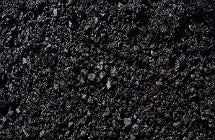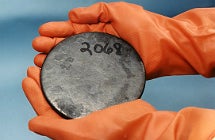
Tough macro-economic conditions meant a poor year for commodities in 2012, but with signs of recovery emerging all over the world – particularly in China and the US – 2013 could be a very different story.
Yet, improving economic conditions will not benefit everyone. While growth in housing markets is great for copper, for example, a stabilising economy doesn’t do anything for the prospects of gold, a traditional safe haven. Furthermore, over supply is set to damage the prices of commodities such as iron ore.
Of course, there will always be a few commodities for which anything can happen, too. In 2013, think oil and rare earth metals.
But whichever way you look, this year is going to be an interesting year. Elly Earls picks the top commodities to watch in 2013.

Copper

Copper will follow an upwards trajectory in 2013, according to Goldman Sachs.
In the company’s March report, it was predicted that the multipurpose metal will increase 16% to $9,000 a metric tonne in six months, largely due to two factors: China’s accelerating economy and the impending recovery of the American housing market.

US Tariffs are shifting - will you react or anticipate?
Don’t let policy changes catch you off guard. Stay proactive with real-time data and expert analysis.
By GlobalDataWhile China’s expected growth was the key factor influencing this prediction, Goldman also believes the American housing market is set for a comeback in 2013, meaning more construction and therefore a greater demand for copper.
PwC agrees, foreseeing that copper, which is used in everything from plumbing and power to automobiles, will thrive this year because of the general recovery of the global economy.
Silver, platinum and palladium

Silver is set to outperform gold in 2013, with many analysts predicting big gains for the precious metal.
HSBC gives four reasons for lifting their forecast for silver: higher industrial demand, steady investment appetite for hard assets, strong coin and bar purchases and a bottoming out of jewellery demand.
Similarly, silver’s cousins, platinum and palladium, are on their way up too, with the positive outlooks for both metals coming from excellent supply-demand fundamentals due to South African supply issues and firm industrial demand.
For UK-based broker Charles Stanley, platinum, silver and palladium could be the commodities to watch in 2013, particularly if industrial demand continues to improve.
Coal and natural gas

Industry reports are mixed for both coal and natural gas, but many analysts are predicting price rises for both commodities.
Goldman Sachs, for example, believe natural gas prices will recover in 2013 and 2014, noting that, although the US market has had an over-supply in natural gas because of new drilling technologies, global gas markets will remain in a deficit in the near to medium term.
The US Energy Information Administration (EIA) also predicts increasing prices, with the authors of a recent report expecting the average price of natural gas to go up by almost a dollar in 2013, hitting $3.74 per million British thermal units.
Of course, increasing natural gas prices would have an unavoidable impact on the price of coal; as natural gas prices rise, coal demand would likely increase, as utilities switch back to using the low cost energy source instead of natural gas.
Growing demand in countries such as China and India, which don’t have the negative public view of coal that developed nations like the US do, could also fuel rises in the price of the commodity.
Uranium

Analysts believe demand for uranium will only increase in the coming years, due to factors such as growing electricity requirements, volatility in fuel prices and a global preference for carbon neutral sources.
Indeed, nuclear projects are popping up in countries all around the world, including China, India, Russia, Ukraine, the US, the UK, South Korea and the United Arab Emirates. The World Nuclear Association has reported that 62 reactors will be under construction worldwide in 2013.
Yet supply is not set to keep up with this growing demand. The Fukushima Daiichi nuclear power plant incident in 2011 significantly depressed share prices for uranium, meaning many companies had to put development and expansion projects on hold. Moreover, the expiry of the Russian Highly Enriched Uranium (HEU) agreement could remove huge amounts of uranium from the global supply.
All of this has prompted analysts to predict a rebound in uranium prices as early as the second half of 2013. They have also emphasised that investors should keep an eye on Japan, as any significant improvement in the market will not really get underway until the country’s recently elected leaders show they are serious about restoring its nuclear power programme.
![]()
Gold

Gold has lost some of its lustre as a safe haven asset due to signs of a global economic recovery.
Indeed, rather than investing in gold as a safe bet, many investors are turning away from the precious metal and moving towards riskier commodities.
This has prompted many analysts to predict a downward turn in prices for the yellow metal, with Goldman Sachs, HSBC and Barclays all slashing their gold forecasts for 2013.
A drop in gold’s average price in 2013 would be its first annual decline since 2002, said commodities research and consultancy CPM Group.
Iron ore

Iron ore is set to experience its first surplus in ten years, with output expanding but Chinese steel mills, the commodity’s biggest buyers, boosting production at the slowest pace in five years.
During the past decade China’s steel production and iron ore consumption has experienced double digit growth rates, but this may finally have reached a plateau.
Indeed, the National Development and Reform Commission forecasts that steel output may only rise by four percent year over year to 746 million metric tonnes in 2013, while iron ore consumption is predicted to grow by 4.8%, or 50 million tonnes, this year.
According to the chief executive of Baosteel, China’s biggest steel producer, demand for steel has entered a ‘period of stability’. This can only have a negative impact on the commodity’s prices.
Anyone’s guess: rare earth metals
Rare earth metals are absolutely vital to the global economy, with manufacturers using them in everything from missiles to smartphones, and 2013 is set to be a pivotal year for these crucial commodities.
Currently, China controls around 95% of the market, but prices are down due to waning demand. China has therefore implemented export limitations, hoping that by curtailing supply, the country can reverse the 2012 slide in prices.
However other nations, such as Japan, the US and Australia, are increasingly getting in on the action too, which could help offset the potential boost in prices and stabilise the market.
It very much remains to be seen which way the rare earth metal market will go, but one thing’s for sure: 2013 will be an interesting year.
Related content
Mining lookout: trends to watch in 2013
Low commodity prices and high operating costs dented mining profits last year, but is business set to improve in 2013?
An appetite for risk – talking remote commodities with Major Drilling
Carrying out specialist drilling in uncompromising environments is what company Major Drilling does best.


.gif)

